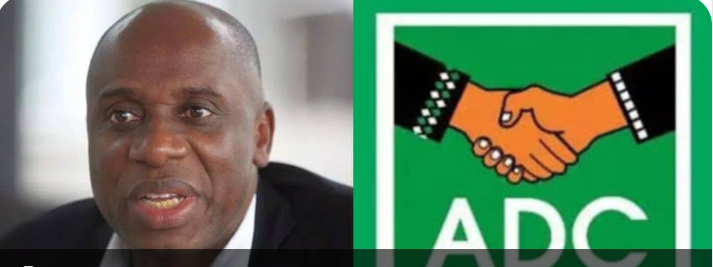
Amaechi Vows to End Corruption in 30 Days or Resign if Elected President in 2027

In a bold and attention-grabbing political declaration, former Minister of Transportation and ex-Governor of Rivers State, Rotimi Amaechi, has promised to eradicate corruption in Nigeria within one month if elected President in 2027—or resign from office if he fails. Speaking during a live discussion on X Space tagged Weekend Politics, Amaechi stunned listeners with his uncompromising stance on tackling what he describes as the root of Nigeria’s economic and governance woes. “If I become President, I will change the constitution from indigeneship to citizenship. If I do not end corruption in Nigeria within one month, I will tender my resignation,” he stated with unwavering confidence, setting a high-stakes challenge for himself and the political establishment.
Amaechi’s comments come at a time when many Nigerians feel a deep sense of frustration over the persistence of corruption despite decades of anti-graft campaigns. He did not mince words in accusing some members of the nation’s ruling elite of looting public resources. According to him, certain influential individuals in government circles regularly visit the Central Bank of Nigeria (CBN) to siphon off funds meant for public projects. “It enrages me that those very influential among the ruling class visit CBN often to steal money,” Amaechi lamented. “If they could use all the money they are pocketing to improve security and the economy, Nigeria wouldn’t be in such dire straits today.”
This fiery remark has already sparked heated conversations across social media platforms, with supporters praising his courage while critics question the feasibility of ending corruption in a country where it has become deeply entrenched in political, economic, and bureaucratic systems. Nonetheless, Amaechi insists that his approach would be swift, direct, and uncompromising, pointing to his record as Governor of Rivers State as evidence of his willingness to make tough decisions.
During the conversation, Amaechi also took a swipe at the leadership of Nigeria’s electoral body, the Independent National Electoral Commission (INEC). He described its current chairman, Professor Mahmood Yakubu, as “the worst INEC chairman in the history of Nigeria,” a remark that immediately ignited debates about electoral credibility in the country. While his critique of the electoral system was sharp, it reflected his larger theme of accountability and reform.
The former Minister did not shy away from addressing his long-standing political rivalry with the current Minister of the Federal Capital Territory, Nyesom Wike. In a veiled jab at Wike’s popularity and perceived health, Amaechi threw down a challenge: “Let him take a walk along the streets of Port Harcourt, which will reveal who is healthy and who the people actually loved.” This remark drew mixed reactions from political observers, with some viewing it as unnecessary personal jabbing, while others saw it as a confident display of grassroots support.
Turning to economic policy, Amaechi made it clear that he would not reverse one of the most controversial decisions in recent Nigerian economic history—the removal of the fuel subsidy. While the subsidy removal has been widely blamed for increasing the cost of living for ordinary Nigerians, Amaechi’s position is that the policy itself is sound but has been poorly implemented. He pledged that under his administration, the savings from subsidy removal would be redirected directly into the hands of ordinary Nigerians instead of ending up in the pockets of political elites. “I will not reverse the removal of subsidies. I will instead direct the funds into the pockets of Nigerians, not the elite,” he said.
Political analysts are already weighing in on Amaechi’s statements, noting that his one-month corruption eradication promise is perhaps the most ambitious anti-corruption pledge ever made by a Nigerian politician. While his critics argue that no leader could realistically dismantle decades of institutionalized corruption in such a short time frame, his supporters believe that his directness and no-nonsense approach could signal a new style of leadership. Many Nigerians, tired of long-winded policy plans and endless excuses, may find his pledge refreshing—even if it raises questions about practical execution.
However, there is also the question of whether the political establishment would allow such radical reforms to succeed. Nigeria’s corruption problem is often described as systemic, with networks of influence and patronage that cut across party lines and sectors of society. For Amaechi to fulfill his one-month promise, he would need extraordinary legal powers, political backing, and a level of enforcement that could shake the foundations of Nigeria’s political class. His proposed constitutional amendment—from indigeneship to citizenship—also suggests he intends to address ethnic divisions in governance, a move that could fundamentally reshape Nigerian politics but would almost certainly face fierce resistance from entrenched interests.
Social media reactions have been swift, with hashtags like #AmaechiOneMonthChallenge and #EndCorruptionNow trending within hours of his statement. Some Nigerians took to X (formerly Twitter) to express hope that such a decisive leader could bring real change, while others accused him of political grandstanding. “We’ve heard these promises before,” one user wrote. “What we need is a realistic plan, not catchy one-liners.” Another countered: “At least he is ready to stake his office on his promise. That’s more than most politicians will ever do.”
Amaechi’s statement also comes against the backdrop of Nigeria’s approaching 2027 presidential elections, where he is expected to be a key contender if he chooses to run. His political career has been marked by high-profile positions, from Speaker of the Rivers State House of Assembly to Governor of Rivers State, and later as Minister of Transportation under President Muhammadu Buhari. While he has had his share of controversies, his tenure has also been characterized by an image of political toughness and administrative decisiveness.
As the political landscape heats up, Amaechi’s bold proclamation may become a central talking point in Nigeria’s next election cycle. His willingness to directly attack powerful figures and institutions could either position him as a fearless reformer or alienate him from influential political blocs. The coming months will reveal whether his pledge gains traction with the electorate or is dismissed as another lofty political promise.
For now, Amaechi’s one-month anti-corruption vow has reignited a national conversation about the urgency of Nigeria’s governance crisis. In a country where public trust in leadership remains low, his gamble could be a masterstroke—or a political miscalculation. Whether or not Nigerians believe that corruption can be wiped out in just 30 days, one thing is certain: Rotimi Amaechi has put himself at the center of the 2027 presidential debate, and the nation will be watching closely to see if he follows through on his words should he secure the presidency.


